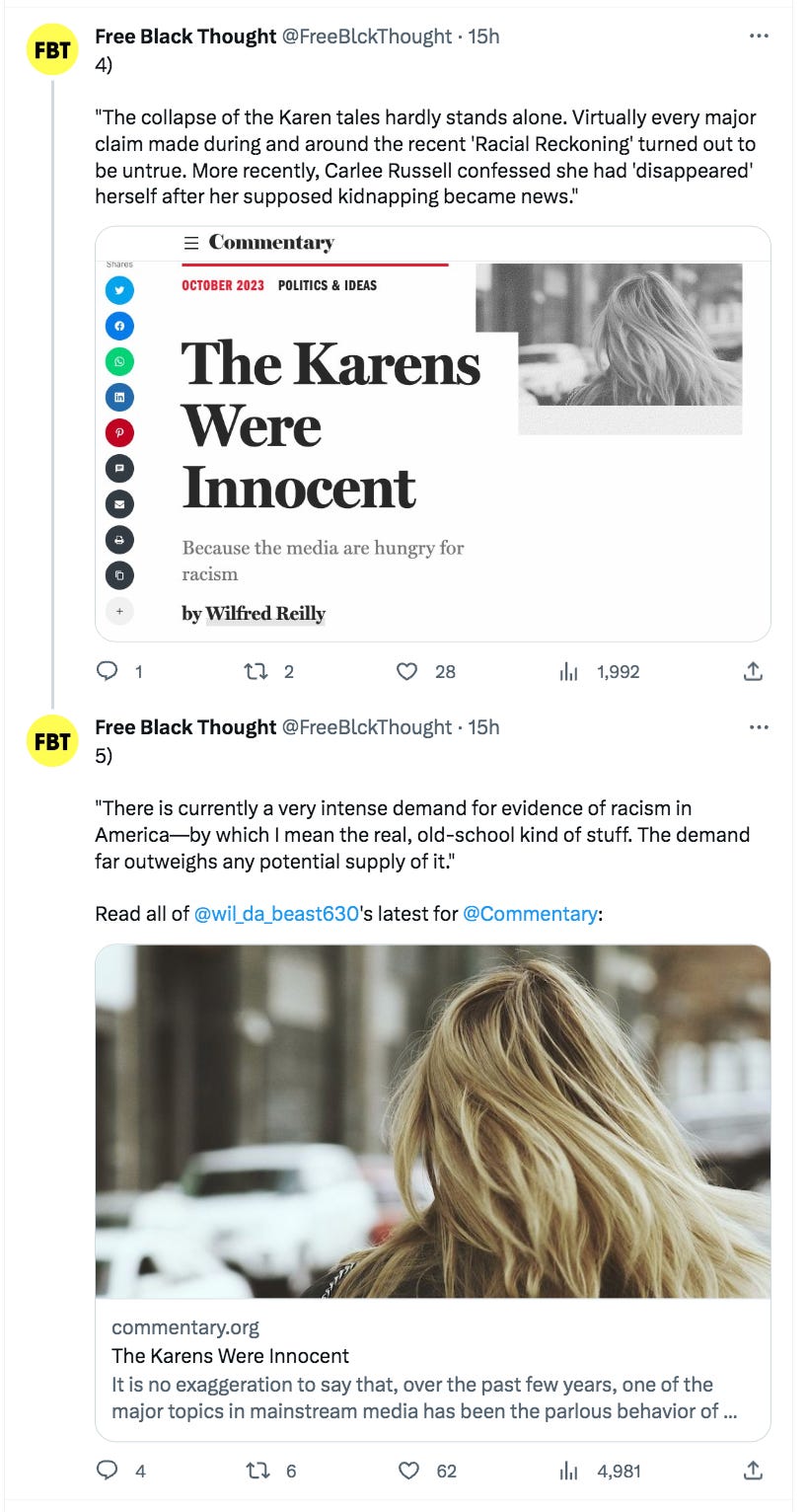E-Pluribus | September 15, 2023
DEI trickles down to primary and secondary education; history in indispensable; and an open letter to Denmark.
A round-up of the latest and best writing and musings on the rise of illiberalism in the public discourse:
Patrick Hughes: Elementary School Teachers Must Now Embrace DEI Principles to Get Hired at Many Public Schools: Study
The debate about the role of diversity, equity, and inclusion (DEI) at colleges and universities has been raging for years now, but Patrick Hughes reports in the New York Post that teachers of younger students are also subject to DEI litmus tests of sorts. Prospective teachers are not simply being evaluated for their ability to teach but, in some cases, for their ideological perspectives as well.
A new report from the National Opportunity Project reveals that school districts across America – in red and blue states alike – are now considering teachers’ social and political views alongside instructional qualifications during the hiring process.
This means that if the teacher at the head of your kid’s classroom was hired in recent years, there’s a strong chance he or she was chosen not for their credentials — but because they passed an ideological litmus test.
The National Opportunity Project surveyed more than 70 school districts across America over the past year about their hiring protocols.
They also reviewed district hiring documents such as applications, interview questions, and candidate evaluation rubrics.
Here is what NOP found: Applicants in the Denver Public School system for an elementary art teacher position must: “Lead for racial and educational excellence and work to dismantle systems of oppression and inequity in our community…”
In Georgia, City Schools of Decatur require hiring teams to be staffed for racial and gender equity by “ensur[ing] that there is at least one person of color and one woman or gender-fluid individual on the interview panel. Individuals who embody other aspects of diversity should be included as well.”
Since when were these characteristics needed to determine who should be teaching our kids?
Indeed, more than one-third of the school districts that responded to NOP’s request for transparency around their hiring practice revealed protocols that are clearly based on ideological bias.
Many more districts tout public commitments to divisive ideologies or DEI (diversity, equity, and inclusion)-focused mission statements. We’ve known for a long time that these types of controversial policies are commonplace in higher education; but only recently are they permeating classrooms with students as young as preschool age.
What’s the reason for all this? As the old adage goes, “Personnel is policy.”
The people behind these policies aim to change the culture of public schools by only hiring staff who adhere to their political and ideological viewpoints.
The districts’ DEI statements — or commitments to “culturally responsive-sustaining education” in the case of New York Public Schools — are not merely lip service.
They inform every element of the public school experience, including who gets to stand at the head of the classroom.
Read it all.
Joel Kotkin: History Matters
Those who don’t know history are doomed to repeat it, the old saying goes. Writing for Quillette, Joel Kotkin says if that’s the case, we’re headed for doom without a change in the way the educational system treats learning about the past.
Universities should be beacons of dispassionate learning, so it is particularly unfortunate that they have also been increasingly complicit in obliterating much that is valuable to historical instruction and understanding. In a 2013 article for the Guardian, Ashley Thorne lamented that university curricula were largely ignoring the literary classics. At many US colleges, Thorne noted, books written before 1990 are considered “inaccessible” to students. This breaks a vital link with the past that allows students to identify with their ancestors as part of an ongoing human story, rather than simply dismissing their thoughts and actions as alien, unintelligible, or even intrinsically evil.
The problem is further exacerbated by the much-discussed decline in academic viewpoint diversity, particularly in the social sciences and humanities. The history profession was once famously disputatious, but over the last generation or so, a diminishing number of conservative or even centrist historians has produced monocultural groupthink. A national survey of faculty members from 183 four-year colleges and universities, conducted in 2005, found that liberals were already seven times more numerous across history departments than conservatives. Without the cut-and-thrust of lively historical debate, history risks becoming an ideological discipline, as was the case in the Soviet Union or China today, taught by rote and incapable of generating excitement and interest.
The consequent decline in historical understanding suggests that generations of students will leave higher education ill-prepared to engage or even bother with the past. The 2018 Programme for International Student Assessment found that 86 percent of 15-year-olds are unable to tell the difference between opinion and fact. This lack of preparation empowers propagandists, who often know little about history to start with, to twist the past to suit their own ideological purposes for an equally ignorant audience.
Less remarked upon is the impact that this ignorance can have on how we understand our present and future. An understanding of the past that dwells exclusively on our crimes, mistakes, and failures at the expense of our achievements produces a distorted picture of human potential and an unwarranted sense of despair. This is particularly evident in the pessimism with which younger generations approach issues like race relations, climate change, and the continuing viability of liberal democracy. For if there is no hope to be found in the past, what possible hope can there be for the future?
Read the whole thing.
Persuasion, Open Letter: Stop Denmark's New Blasphemy Ban
As noted at Pluribus recently, Denmark is considering legislation in response to violence related to Quran burnings in the country. Persuasion has now published an open letter that, while acknowledging that burning books and anti-religion destruction is provocative and counterproductive, condemns Denmark’s attempt to outlaw blasphemy and other hateful speech as doing more harm than good.
Denmark, in 2017, followed in the footsteps of other democratic nations like Norway, the Netherlands, Iceland, Ireland, and New Zealand by repealing its laws against blasphemy and religious offense. This repeal signified an important step towards safeguarding freedom of expression and maintaining a pluralistic society. The proposed Danish bill, in essence, reintroduces a ban on blasphemy, and is so broad as to include even artistic expressions.
The bill aligns Denmark with the Organization of Islamic Cooperation (OIC), which has repeatedly called for international blasphemy laws that would severely undermine the protection of freedom of expression under international human rights law. The OIC includes states like Saudi Arabia, Pakistan, and Iran, where blasphemy is punishable by death. As recently as May 2023, two Iranian men faced such an extreme punishment for the alleged crime of burning the Koran, the very activity that the Danish government is seeking to prevent.
[. . .]
We agree that the burning of books, or any other form of destruction of religious objects, is often a crude and ineffective means of expression and a poor substitute for reasoned debate. We also categorically distance ourselves from the anti-Muslim bigotry that has frequently accompanied such acts. Racism, religious hatred, and intolerance are grave issues that demand attention from all who are committed to freedom, democracy, and equality. Nonetheless, we argue that the values of freedom of expression and of tolerance are not mutually exclusive but are, in fact, mutually reinforcing. Laws that restrict freedom of speech in the name of preventing offense inevitably undermine the democratic ideals they claim to protect, and they legitimize oppression at home and abroad.
Read it all here.
Around Twitter
Via Free Black Thought, here’s a thread on Wilfred Reilly’s essay for Commentary on the “Karen” phenomenon, which Reilly argues was largely imagined:
Here are a few excerpts from Colin Wright’s expert testimony related to proposed legislation in Texas:
And finally, the full video is 42 minutes, but even a few minutes of listening to 93-year-old Thomas Sowell will be worth your time. Peter Robinson interviews Sowell about his 40th (!) book, Social Justice Fallacies:














“ woman or gender-fluid individual”-- not that I believe in having quotas (for hiring panels or anything else) based on immutable (and generally irrelevant) personal characteristics like sex, but doesn’t this pretty much guarantee a return to all-male panels except that some of the men are now pretending to be women? Oy.